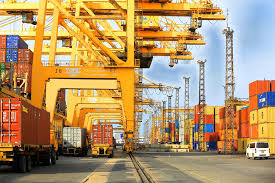India's Adani port scuttles cargo traffic in Colombo
The number of container ships calling in July dropped by 17.8% compared to 2023. The lower costs of India's competitor and the critical situation in the Red Sea, the scene of Houthi attacks on cargo ships with repercussions on routes and costs, weighed heavily. On the contrary, container volumes between the main global hubs are growing.
Colombo (AsiaNews) - In July, cargo transhipment volumes handled by the Port of Colombo fell for the third consecutive month, bringing to a total of four the number of months in which a negative index was recorded this year.
Among the reasons for this is the fierce competition from Adani Group's rival port Vizhinjam, which has recently started operations in southern India. As a result, the number of container ships calling at the Sri Lankan capital's maritime infrastructure fell by 17.8% year-on-year (YoY) to 277 ships in July. This is the steepest decline for 2024.
Due to long docking times and congestion, merchant ships were forced to skip the Colombo area, which partially benefited ports on the Indian coast, particularly those of Cochin and Ennore.
Meanwhile, the transhipment volume handled by the capital's port reached 528,348 20-foot equivalent units (TEUs) in February. The port recorded double-digit growth since December 2023, when volumes had increased 10.4 per cent year-on-year to 515,404 TEUs.
Moreover, January this year showed a 25.5% year-on-year acceleration to 562,527 TEUs, an increase of 29.1%, closely linked to the ongoing disruptions in the Red Sea.
The volume of trade through the Suez Canal plummeted by 50% year-on-year in the first two months of 2024, with almost 50% of cargo ships and tankers diverted to alternative routes around the Cape of Good Hope.
Behind the forced route reversal, with huge consequences on transport time and costs, are attacks on commercial vessels in the Bab-el-Mandeb Strait by Houthi militias from Yemen, in response to the war in Gaza. However, according to IMF-Port Watch data, the overall flow of containers in the Port of Colombo has increased.
In the first half of this year, the facility recorded the highest container volume growth rate among major global hubs, thanks to incremental gains from Red Sea-bound ship diversions. In effect one of Asia's busiest container hubs, the Port of Colombo has four facilities: Jaya Container Terminal (Jct), South Asia Gateway Terminal (Sagt), East Container Terminal (Ect) and Colombo International Container Terminal (Cict), operated by China Merchants Port Holdings.
Senior port officials explain to AsiaNews that ‘on the contrary, overall transhipment volumes increased by 7.3% year-on-year to 3.68 million TEU, thanks to the double-digit increase recorded in the first four months of this year.
This situation, they continued, ‘occurred before the port suffered severe congestion, resulting in significant delays that prompted shipping companies to reroute some of their services’.
‘Although the Vizhinjam International Port of Adani began commercial operations on a limited scale as of 11 July this year, it has positioned itself,’ they continue, ’to benefit from this development. Vessel rates (Vrc) for Vizhinjam's port calls have been set at a substantially lower level compared to the port of Colombo.
A ship of 30 thousand gross tonnes, requiring a 24-hour stay at the berth, would ‘only’ have to pay around 10 thousand dollars in Vizhinjam, compared to around 21 thousand in Colombo.
‘A network renewal plan has been drawn up to shift some transhipment calls for Indian goods, which usually pass through Colombo Port, to Vizhinjam Port. The port's only fully operational deep container terminal, the Jct, handled 271,143 TEUs during the year, down 3.5% year-on-year. The Jct, operated by the Sri Lanka Ports Authority, and its partly operational Ect together handled 179,636 TEUs, down 1.54% year-on-year,' officials point out.
Transshipment volumes started to decline gradually in May. In June, the port recorded a year-on-year drop of 5.1 per cent, with a 20.1 per cent drop in the number of container ships calling at the port. The delays are related to the fact that the port yard has been operating beyond its capacity, so that delays of up to 21 days are currently recorded.
24/01/2007







.png)










